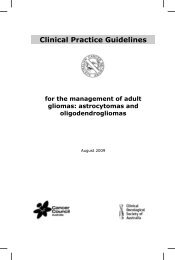Clinical Practice Guidelines for the management of locally advanced ...
Clinical Practice Guidelines for the management of locally advanced ...
Clinical Practice Guidelines for the management of locally advanced ...
Create successful ePaper yourself
Turn your PDF publications into a flip-book with our unique Google optimized e-Paper software.
Evidence summary Level References<br />
There is no evidence to support <strong>the</strong> routine use <strong>of</strong> extended field<br />
radio<strong>the</strong>rapy <strong>for</strong> <strong>locally</strong> <strong>advanced</strong> prostate cancer. The role <strong>of</strong><br />
whole pelvis radio<strong>the</strong>rapy has yet to be defined.<br />
There is some evidence to support <strong>the</strong> increased efficacy <strong>for</strong> doseescalated<br />
external beam radio<strong>the</strong>rapy <strong>for</strong> biochemical and clinical<br />
relapse. These data have not yet translated into improved survival or<br />
a reduction in distant disease-free survival. There is some evidence<br />
that dose-escalation increases toxicity, however, <strong>the</strong> impact on<br />
quality <strong>of</strong> life is yet to be determined. It is uncertain whe<strong>the</strong>r any<br />
benefits <strong>of</strong> dose escalation can be generalised to patients receiving<br />
neoadjuvant and/or adjuvant endocrine <strong>the</strong>rapy.<br />
There is evidence that con<strong>for</strong>mal radio<strong>the</strong>rapy decreases toxicity<br />
compared with conventional radio<strong>the</strong>rapy<br />
Recommendation<br />
II 62-64, 66,<br />
71-76, 78-82<br />
When radiation <strong>the</strong>rapy alone is used, limited field radio<strong>the</strong>rapy has similar efficacy and has<br />
less toxicity than whole pelvis and <strong>the</strong>re<strong>for</strong>e is recommended. The role <strong>of</strong> whole pelvis<br />
radiation is yet to be defined.<br />
Consideration should be given to dose escalation (74Gy or higher) if it can be delivered<br />
safely.<br />
Patients with <strong>locally</strong> <strong>advanced</strong> prostate cancer should receive 3D con<strong>for</strong>mal radiation to<br />
minimise toxicity.<br />
Grade C<br />
External beam radio<strong>the</strong>rapy compared with o<strong>the</strong>r treatments <strong>for</strong> local control<br />
The <strong>management</strong> <strong>of</strong> <strong>locally</strong> <strong>advanced</strong> prostate cancer has long been controversial. For patients with a<br />
reasonable life expectancy, radio<strong>the</strong>rapy has traditionally been utilised. More recently, hormonal<br />
<strong>the</strong>rapy combined with radio<strong>the</strong>rapy has been shown to improve outcomes. ADT alone has<br />
traditionally been used <strong>for</strong> <strong>locally</strong> <strong>advanced</strong> disease in patients with a poor per<strong>for</strong>mance status and/or<br />
significant co-morbidities predicting a short life expectancy. Locally uncontrolled disease can be a<br />
morbid situation <strong>for</strong> patients, however, and may cause symptoms related to obstruction, renal<br />
impairment, bleeding and pain.<br />
Prior to 2006 (<strong>the</strong> cut-<strong>of</strong>f date <strong>for</strong> inclusion <strong>of</strong> trials <strong>for</strong> this analysis), <strong>the</strong>re were only three<br />
randomised trials comparing radio<strong>the</strong>rapy with alternative treatment approaches <strong>for</strong> <strong>locally</strong> <strong>advanced</strong><br />
prostate cancer. These all asked different questions, contained small numbers <strong>of</strong> patients (between 73<br />
and 151 patients), used old techniques, and provided conflicting results.<br />
There was a suggestion <strong>of</strong> improved survival <strong>of</strong> radio<strong>the</strong>rapy over orchidectomy in one study <strong>of</strong> 151<br />
patients 8, 9 , but at a cost <strong>of</strong> increased toxicity. Ano<strong>the</strong>r study <strong>of</strong> 73 patients 83 suggested that<br />
radio<strong>the</strong>rapy compared with observation did not delay <strong>the</strong> first onset <strong>of</strong> metastases but no long-term<br />
follow-up with survival was given. A third study <strong>of</strong> 95 patients 84 suggested an improvement in<br />
progression-free survival with surgery and hormones versus low-dose radio<strong>the</strong>rapy plus hormones,<br />
but at <strong>the</strong> cost <strong>of</strong> increased toxicity in <strong>the</strong> surgery group. Long-term follow-up <strong>of</strong> <strong>the</strong> Akakura study<br />
published since 2006 85 has demonstrated similar results with a non-significant trend <strong>for</strong> improved<br />
disease-free survival but at increased toxicity.<br />
27<br />
Locally <strong>advanced</strong> disease



